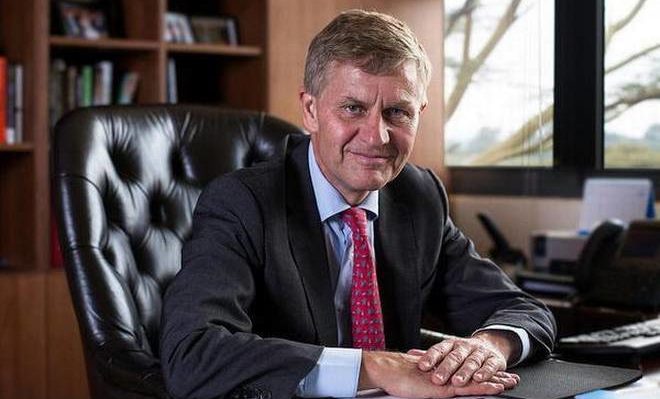 The floods in Kerala were an absolutely shocking example of how we are already seeing the devastating impact of climate change, says Erik Solheim, head of UN Environment. As former Minister of Environment and International Development, Norway, he had put in place the Nature Diversity Act, which many consider as the country’s most important piece of environment legislation in so many decades. An experienced peace negotiator, Mr. Solheim had acted as the main facilitator of the peace process in Sri Lanka from 1998 to 2005, which led to a ceasefire and the Oslo Declaration in 2002. In an e-mail interview, the Executive Director of United Nations Environment Programme pointed out that there is no excuse for inaction on climate change.
The floods in Kerala were an absolutely shocking example of how we are already seeing the devastating impact of climate change, says Erik Solheim, head of UN Environment. As former Minister of Environment and International Development, Norway, he had put in place the Nature Diversity Act, which many consider as the country’s most important piece of environment legislation in so many decades. An experienced peace negotiator, Mr. Solheim had acted as the main facilitator of the peace process in Sri Lanka from 1998 to 2005, which led to a ceasefire and the Oslo Declaration in 2002. In an e-mail interview, the Executive Director of United Nations Environment Programme pointed out that there is no excuse for inaction on climate change.
United Nations Chief Antonio Guterres had cited the devastating floods in Kerala twice this month among other natural disasters across the world to highlight the urgency of climate crisis. Is climate change “moving faster than we are”?
At the moment, yes, I’m afraid it is. The data shows that even if all the commitments under the Paris Agreement are met — including those from the United States before President Trump announced he was pulling out — then we’re still headed for a temperature rise of 2.9 to 3.4 oC this century. That’s too far above the minimum goal of limiting temperature rise to 1.5 oC.
At the same time, we’ve seen a remarkable shift in China and India, both of whom are moving rapidly towards renewables, and of course Europe is continuing to lead in innovation and deployment.
Even in the United States, investors have got the message that renewables are a better bet than coal.
The urgency of this is clear for everyone to see. It’s playing out right in front of us. But the opportunities and the solutions are also there. So really there is no excuse for inaction.
I’m optimistic that we’ll see exponential progress. We’re at a turning point and, broadly speaking, we are moving in the right direction — just not yet fast enough.
The next few years will be critical, because science also tells us we have a tight window of opportunity to halt the course of runaway climate change.
Kerala has lost hundreds of lives and suffered damages worth crores of rupees in the devastating floods. How can India expedite the adaptation and mitigation measures to avert the risks posed by extreme weather events to its communities and their livelihood?
The floods in Kerala were an absolutely shocking example of how we are already seeing the devastating impact of climate change.
In terms of mitigation, we are already on an amazing trajectory, and in New Delhi and many States I’ve seen incredible innovation and action. India is getting off coal and going big on solar. It’s made huge strides on energy efficiency. It has the potential to lead the world on renewable mega-projects, on clean mobility, and on the harnessing of new technologies like blockchain in improving economic efficiency and lowering emissions. In India I’ve also seen exciting infrastructure and building projects, the kind we need for the low carbon urban spaces of the future. India’s pledge to phase out single-use plastic will also cut another source of carbon impact. It’s now a case of doing everything possible to unleash these positive developments and allow them to really disrupt the business as usual mindset. India will be a huge winner.
Adaptation is also crucial to get right. The bottom line here is that India — just like every other country — now needs to seriously think about climate and its impact in urban planning, infrastructure, agriculture and more. It will require tough choices and big changes, but these are also opportunities.
What are the key takeaways for India and the rest of the world from the 2018 New Climate Economy Report ahead of the milestone 2020 meeting of parties to the Paris Agreement?
The key message is that climate change needs to be seen as an opportunity as much as it is a problem. In fact, the latest data shows that we are massively under-estimating the bounty of economic benefits that come from positive climate action, and that climate action will unlock economies, not hold them back.
We also need to move more quickly to putting a price on carbon, and also pricing it at a level that can drive the kind of massive shifts in financing flows that we need. Infrastructure also needs to be a priority. We’re on the cusp of massive global infrastructure development, and we need to integrate climate and sustainability into these projects.
Another key theme is that of innovation — and putting in place the kind of policies that will help unlock it.
That means creating a level playing field for the green economy to have a fair fight, and for the markets to shift and for new ideas and products to flourish. That means empowering the private sector. Finally, we need to put people at the centre of our work. After all, this is about people and planet.
(thehindu)
